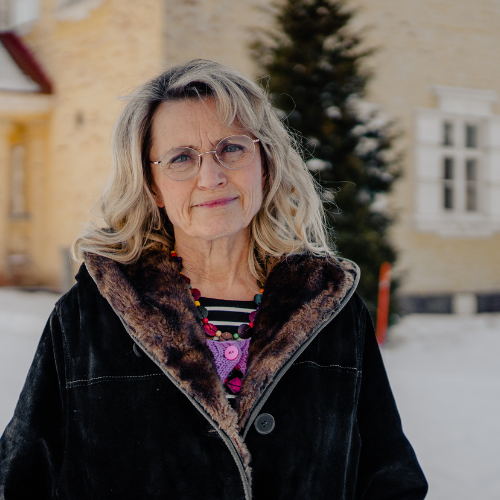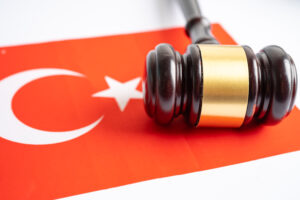- Final stage of “hate speech” trial to set precedent for free speech and religious freedom across Europe
- Despite two unanimous acquittals, prosecutors continue to pursue charges against Finnish parliamentarian Päivi Räsänen and Bishop Juhana Pohjola
- ADF International will host post-trial press conference at 16:00 CET. Register here.

HELSINKI (29 October 2025) – Tomorrow, the Supreme Court of Finland will hear the landmark case of Finnish parliamentarian Dr. Päivi Räsänen and Bishop Juhana Pohjola, who stand accused of “hate speech” for publicly expressing their Christian beliefs. The case, which began over a 2019 tweet quoting the Bible, will now be heard at the nation’s highest court following two unanimous acquittals—first by the Helsinki District Court in 2022 and then by the Court of Appeal in 2023.
The Supreme Court’s decision will determine not only the fate of the defendants, but also set a precedent for the future of free speech and freedom of religion in Finland and across Europe.
« In a free society, it should never be a crime to share a Bible verse or express beliefs rooted in faith. The burden of the legal ordeal of the past few years has been challenging, but I remain hopeful that justice will prevail — not only for me, but for the wider principle of free speech in Finland. No one should face criminal charges for peacefully voicing their convictions, » said Räsänen ahead of the trial.
Räsänen, Finland’s former Minister of the Interior, faces two criminal charges for expressing her deeply held beliefs on marriage and sexuality—through a 2019 tweet and a 2004 pamphlet published by Bishop Pohjola. All are prosecuted as “agitation against a minority group,” a charge listed under the section of the Finnish Criminal Code concerning “War Crimes and Crimes Against Humanity.”
If convicted, Räsänen and Pohjola face thousands of euros in fines and the censorship of the tweet and the church booklet, which express traditional Christian teachings.
“It should not be considered a crime to pass on what Christians have always believed”.
- Rev. Bishop Juhana Pohjola
Speaking ahead of the hearing, Bishop Juhana Pohjola said:
“The process has been long, and that’s why I’m pleased that it is coming to an end. I look forward to the oral hearing with confidence, where we can, with a clear conscience and openly, express how every person has an inviolable human dignity and what the Christian view of marriage means.”
“This case is larger than me or Päivi Räsänen. It is about whether Finland will remain a country where freedom of speech and religion are respected in practice, not just in theory. The Christian message of marriage and sexuality has been taught for two millennia, and it should never be considered a crime to speak what Christians have always believed,” Pohjola continued.
Free Speech on Trial
Paul Coleman, Executive Director of ADF International, which is coordinating Räsänen’s legal defense, stated:
“In a democracy, no one should face criminal prosecution for expressing deeply held beliefs. Criminalizing peaceful speech through so-called ‘hate speech’ laws not only silences important conversations—it endangers democracy itself. The years-long prosecution of Päivi Räsänen has created a climate of fear, signaling to others that certain opinions, including those grounded in faith, are unwelcome in public life. Finland’s Supreme Court now has the opportunity to protect freedom of speech and set an example for the rest of Europe.”
From Tweet to Supreme Court
The case began in 2019 when Räsänen, a member of the Finnish Lutheran Church, questioned her church leadership’s decision to sponsor the Helsinki Pride event. Her tweet, which included a photograph of Bible verses, triggered a police investigation. Over several months, Räsänen was subjected to more than 13 hours of police interrogation, during which she was repeatedly asked to explain her theological understanding of Scripture.
In 2021, Finland’s Prosecutor General brought three criminal charges against her. Bishop Pohjola was charged for publishing Räsänen’s 2004 pamphlet on the Christian understanding of marriage and sexuality.
A Global Test Case for Freedom
The case has drawn international concern from legal experts, parliamentarians, and religious freedom advocates who view it as a test for whether Finland—a member of the European Union and Council of Europe—will uphold its human rights commitments under international law.
Both the District Court and Court of Appeal unanimously acquitted Räsänen and Pohjola, finding that it is not the role of the state to “interpret biblical concepts.” Nevertheless, the prosecution appealed once again, bringing the case before the Supreme Court, which will hear the case tomorrow and then issue a final ruling in the coming months.
Press Conference Registration
ADF International will host a press conference after the Supreme Court trial on 30th October at 16:00 CET.
Dr. Päivi Räsänen, MP, Bishop Juhana Pohjola, Paul Coleman, Executive Director of ADF International, and Finnish criminal defense lawyer, Matti Sankamo, will be available for questions after a brief statement by Räsänen.
Please register here to access the Zoom link to the press conference.
To request an interview with Räsänen or a member of her legal team from ADF International, contact Sofia Hörder at [email protected] / +43 676 362 5093











